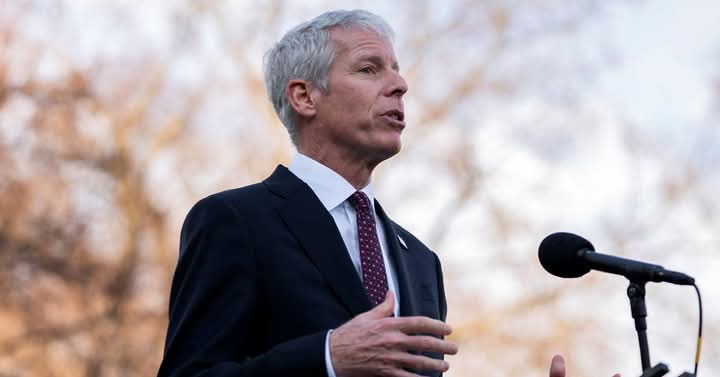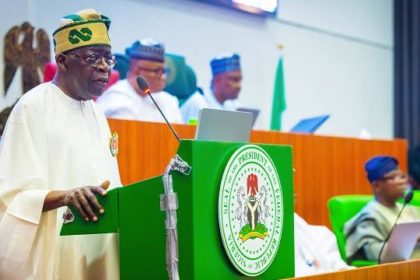
By Adeyemi Adekunle
While addressing the CERAWeek energy conference, U.S. Energy Secretary Chris Wright has emphasized that global warming is an unavoidable consequence of modern development and declared intentions to dismantle previous climate policies to bolster fossil fuel industries.
Wright, a former fracking executive and CEO of Liberty Energy, was confirmed as Energy Secretary in February 2025. His appointment signaled a significant shift in the nation’s energy policy, aligning with President Donald Trump’s agenda to prioritize energy independence and economic growth.
Wright in his keynote speech explained the indispensable role of fossil fuels in the global economy, asserting that oil, gas, and coal are foundational to modern society. He argued that the benefits derived from these energy sources, such as increased life expectancy and technological advancements, outweigh the environmental costs.
“We have indeed raised global atmospheric CO₂ concentration by 50% in the process of more than doubling human life expectancy, lifting millions out of poverty, and launching modern medicine,” Wright stated.
Wright was critical of the climate initiatives implemented under former President Joe Biden, describing them as “myopic and destructive.” He argued that policies promoting renewable energy and electric vehicles were ineffective and detrimental to economic growth. “The cure was far more destructive than the disease,” Wright remarked, emphasizing that such policies hindered the development of essential fossil fuel infrastructure.
Under Wright’s leadership, the Department of Energy has embarked on a mission to reverse several climate-focused policies from the previous administration. This includes expediting permits for oil and gas projects, expanding liquefied natural gas (LNG) exports, and reducing regulatory barriers that, according to Wright, have stifled energy production.
One notable initiative is the approval of Delfin LNG’s export extension to Asia and Europe, aiming to strengthen the U.S.’s position as a leading LNG exporter. Wright expressed a desire to double the current LNG export capacity, underscoring the importance of meeting the growing global energy demand.
A significant aspect of Wright’s address was his focus on global energy poverty. He highlighted the necessity of increasing fossil fuel consumption, particularly in developing nations, to improve living standards and support economic development. “We must address global energy poverty by ensuring access to reliable and affordable energy,” Wright asserted, suggesting that fossil fuels are currently the most viable option to achieve this goal.
Wright’s remarks have elicited mixed reactions from various stakeholders. Industry leaders at the conference welcomed the administration’s pro-fossil fuel stance, anticipating a more favorable regulatory environment that could lead to increased investments and job creation. The emphasis on LNG exports is seen as a strategic move to capture a larger share of the global energy market, particularly in Asia and Europe.
However, environmental advocates have expressed deep concern over the potential rollback of climate policies. They argue that prioritizing fossil fuels undermines efforts to combat climate change and transition to sustainable energy sources. Critics also point to the environmental and health impacts associated with increased fossil fuel extraction and consumption.
“This approach ignores the urgent need to reduce greenhouse gas emissions and invest in renewable energy,” said a spokesperson from a leading environmental organization.
An area of particular concern is methane emissions, a potent greenhouse gas with a significant impact on global warming. The U.S. oil and gas industry reportedly loses $3.5 billion worth of methane annually, which could otherwise meet the energy needs of millions of homes. Addressing methane leaks presents an opportunity for immediate, cost-effective climate impact reduction.
Technologies for monitoring and cutting emissions are available, and Texas is a hub for these innovations. Capturing and selling this methane as natural gas aligns with core business interests, enhancing efficiency, resilience, and competitiveness.
The policy shift in the U.S. has significant global implications, particularly concerning international climate agreements and collaborations. The move to prioritize fossil fuels may affect the country’s commitments to global climate initiatives and could influence other nations’ energy policies. There is a growing concern that this stance may hinder global efforts to reduce greenhouse gas emissions and combat climate change.
As the administration moves forward with its energy agenda, the balance between economic growth and environmental sustainability remains a contentious issue. The debate underscores the complexity of addressing climate change while ensuring energy security and economic development. The coming years will be pivotal in determining how the U.S. navigates these challenges and what role it will play in the global energy landscape.
Secretary Chris Wright’s asserted that global warming is a side effect of building the modern world reflects a pragmatic acknowledgment of the trade-offs inherent in energy production and consumption. However, it also raises critical questions about the future direction of U.S. energy policy and its alignment with global efforts to address climate change. The administration’s focus on fossil fuels may drive economic growth in the short term, but the long-term environmental consequences remain a subject of intense debate and concern.



